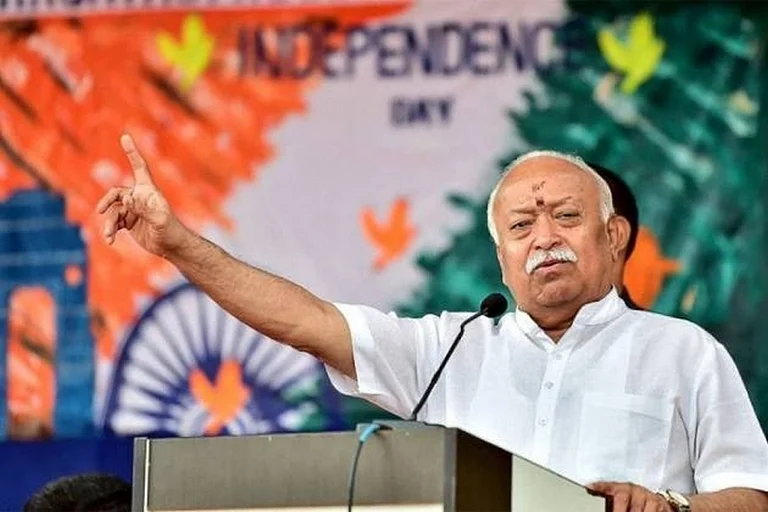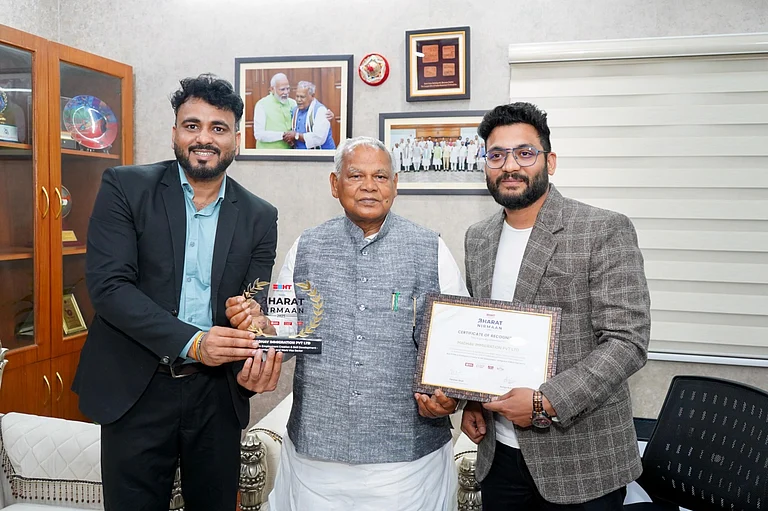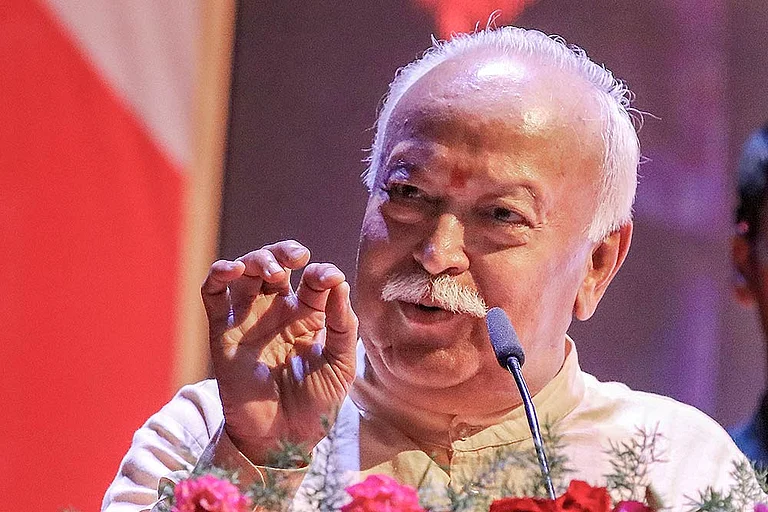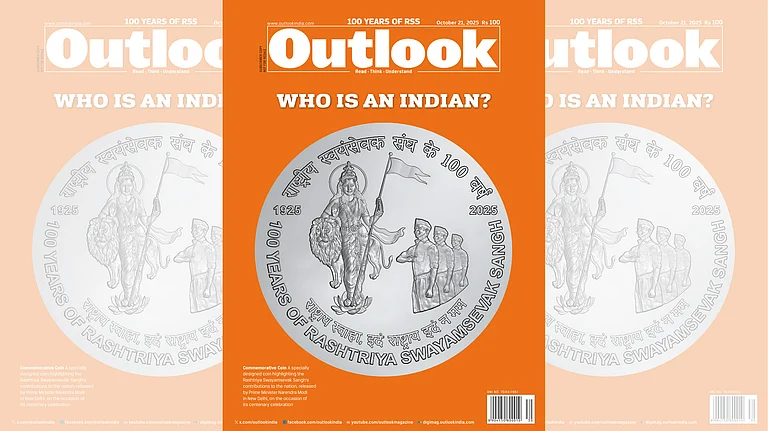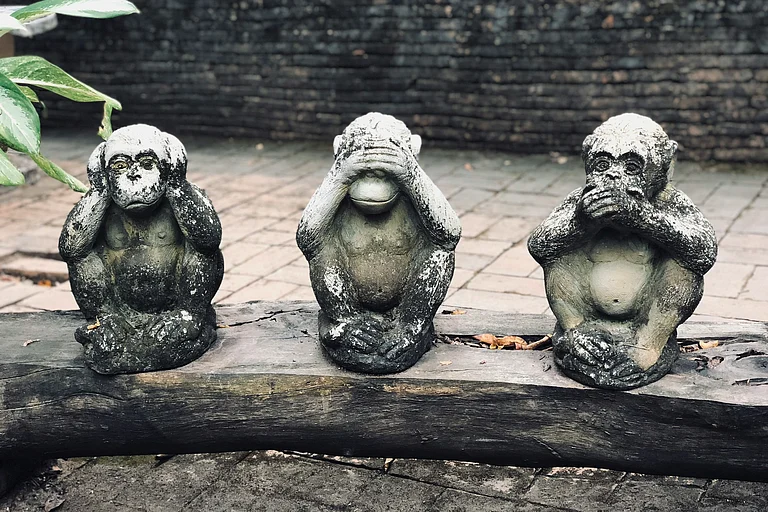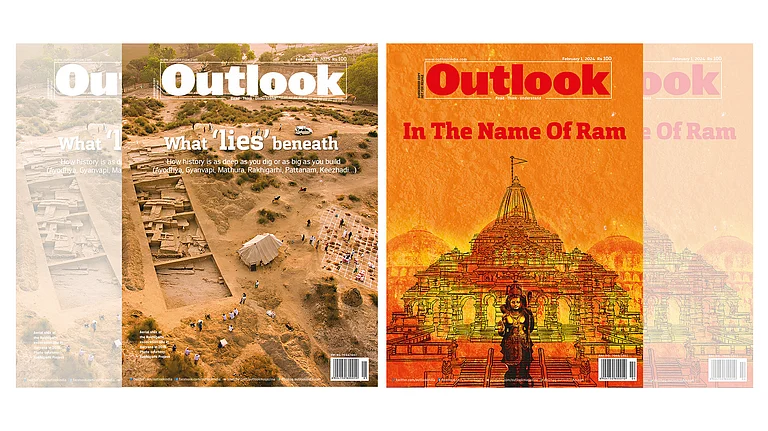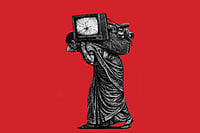
Ram Madhav, who has served as the National General Secretary of the Bharatiya Janata Party, said that the RSS is often misunderstood due to limited public literature on its ideology.
Its continued growth and relevance, unlike ideologically rigid organisations such as the Communist Party, stem from its flexibility — drawing from ancient Hindu civilisation rather than adhering to a fixed ideological framework.
Each RSS chief has contributed new dimensions to its evolution: Hedgewar’s political mission of national freedom, Golwalkar’s spiritual emphasis, Deoras’s social reform efforts and Bhagwat’s push for openness and inclusivity.
“Hindu or Muslim does not matter. You just have to be qualified for the post,” says Ram Madhav, when asked if a Muslim can head the Rashtriya Swayamsevak Sangh (RSS). Madhav—who has served as the National General Secretary of the Bharatiya Janata Party (BJP) and is also associated with the RSS—however, says that the RSS believes this country to be a Hindu nation. In an interview with Outlook editor Chinki Sinha, he talks about the organisation’s views on Hindus, Hindu Rashtra, ghar wapsi, love jihad, caste, reservations, political influence, Adivasis, the three children norm, women … and his new book. Edited excerpts from a video interview:
Your new book Shakha to Nation carries interesting speeches from Sangh pracharaks over the years. How did you come up with the idea of the book?
As an organisation, the RSS is a little difficult to understand but very easy to misunderstand. The misunderstanding stems from the fact that there is not much literature about what the RSS stands for or what its leaders have articulated. That kind of literature is available to the followers, but the public has always depended on the critics of the RSS to understand the organisation. The understanding has largely been very lopsided. So, we thought about presenting the views of the RSS leaders—from the first chief, who founded the organisation in 1925, to the current chief, Mohan Bhagwat, who is the sixth chief.
It’s not easy for any organisation to complete 100 years. If you could elaborate on the adaptability factor.
A unique aspect of RSS’ 100-year journey is that despite its long existence, it is also constantly growing. Other organisations, after a few years or decades, tend to stagnate. The Communist Party of India, for instance, began its journey in India just one year before the RSS was founded. But look at the RSS at 100. It has emerged as the mainstream of the country and is still growing. The reason is that the RSS has not imprisoned itself with a fixed ideology. Binding to an ideology means fixing certain frameworks. The Communist Party had an ideology and it is stuck today because that ideology has become irrelevant. As a result, the party has also become less relevant. The RSS never said that it is going to propagate any new ideology. The speeches carried in the book mention that our thought process is based on the ancient Hindu culture, history, experiences and civilisation. We are taking all the good aspects from the ancient Hindu civilisational history and trying to make Hindu society aware of those things. The RSS has tried to keep itself contemporary. That has been the secret of the organisation’s survival and growth. It faced a lot of adversities. Any other organisation would have collapsed.
What about caste?
Founder K.B. Hedgewar’s views were very political. When he started the RSS, the very first mission of every RSS member was to free India. Golwalkar added a spiritual and religious dimension. When Balasaheb Deoras became the third chief, he added a major social dimension. He was the one to first articulate that caste has outlived its utility.
Golwalkar had a slightly different view. He was not glorifying the present-day caste system, but he tried to differentiate it from the ancient system of varnas. Probably the current caste system has become corrupted because of certain evil things that have crept in. But Balasaheb was more forthright. He went one step further to say that this caste system has outlived and should go. That was a major step forward for the RSS. Based on that idea, the RSS launched its service activities among the country’s poor and socio-economically backward people. The RSS has focused on these services in the 90s and early 2000s. Now, under Bhagwat, the RSS has started becoming more open as an organisation. These new things that each chief has added, free from any shackles of a fixed ideological framework, have helped this organisation grow and remain relevant even today.
What about reservations?
The RSS has a very clear view on reservations. Politics plays a big role in keeping caste differences alive in our society, but as long as these differences exist, certain sections of society will need a support system. In that sense, reservations are a very important today. They have to continue.
What about the role of women in the RSS?
It has to be seen in two different components. One is the role in the organisational activity per se. The RSS shakhas happen at 6 AM. The women have been given separate shakhas. That should not be seen as discrimination. Different activities have been created for men and women based on the nature of the activities.
In terms of thought process and wider social activity, women play a big role in the RSS today. In the RSS annual meetings, 15-20 per cent of participants are women. Over the years, the numbers have increased and it’s good for the RSS because our views on women are very forward- looking.
Is the RSS also looking at gender roles that have existed throughout and have been challenged by the Western feminism models, which the RSS doesn’t think work in India?
The Western feminist movements were the products of Western experience. That experience needed to be the same in India. In India, women have always been accorded a place of dignity and honour. Yes, certain evils have crept into our system, because of which women sometimes feel suffocated. We have a patriarchal mindset that has developed over certain decades or centuries …
… that’s where the Manusmriti comes in …
Do you know Manusmriti offers four situations where a woman can divorce a man? Tell me which other religion has allowed that? It’s easy to criticise Indian scriptures. Whether Ramayan or Mahabharat, women are presented as fierce and independent. Look at Draupadi and Sita. Our portrayal has always been about dignity. Yes, certain evils have crept in, and that’s where issues like Manusmriti come up. One shloka in the Manusmriti is misunderstood. It says, in difficult situations, men have to protect women, when necessary. This can be debated and if you don’t like it, reject it. No scripture in Indian history or civilisation is eternal except certain core beliefs. They can change. We do have stringent laws for women. But did the Nirbhaya Law stop assaults on women? The problem is that you have not taught society that women need to be respected.
And how is the RSS going to do that? There is an increased emphasis on women and they are also very active.
Gender has no low and high. The RSS has been encouraging women to join more activities. We have a number of sister organisations which have a large number of women participants. We encourage more and more women to come forward. We believe they have an equal role to play in the remaking of the country, in rebuilding our society and nation.
Talking about rebuilding and reimagination, how would you reimagine India as a Hindu Rashtra?
Post-Independence, we interpreted a wrong meaning of secularism. This was courtesy the Nehruvians and the Leftists. Many Western countries have declared themselves as Christian countries in their Constitutions. In our constitution, we call ourselves as secular and socialist. Are those countries communal or anti-secular? No. Every nation respects its own cultural and civilisational roots. They are, sometimes, represented through their religion. But in India, post-Independence, if its anything to do with Hindu, we look at it with a negative prism. That was not the case during the Independence movement. Look at Aurobindo Ghosh, Lokmanya Tilak, Savarkar, Gandhi and even Ambedkar. He used to openly say that there is no salvation for Indian society unless the Hindu religion is reformed. They all felt that for India to progress, this reform was necessary. When the RSS followed the same spirit, initially, there were no issues. But post-Independence, the RSS has been branded as communal. This whole thing stems from that misunderstanding about the word Hindu. That’s why the current RSS chief has said, if you still have those mental blocks about Hindu, use Bharatiya.
“We encourage more and more women to come forward. We believe they have an equal role to play in the remaking of the country.”
But the RSS has been very brahmanical in its functioning …
Do you know the Maoists always had an upper caste leader. The Communist Party Polit Bureaus never had a single Muslim …
… but the RSS believes every Muslim is also Hindu …
We have had people from different social strata. Since you asked that question, I’m compelled to say this. One of the RSS chiefs was not a Brahmin. We ensure that every section of society is represented in its hierarchy. To call RSS a brahminical organisation is a frivolous thing. The current view of Hindutva or the Hindu Rashtra concept is that you have to build a harmonious society. You have to be conscious of protecting your family values.
There is a criticism that the RSS does not respect the Constitution.
It’s a wrong notion. In 1950, when the Constitution was promulgated, Golwalkar said to all RSS members, irrespective of what your views are, we must respect the Constitution. That has been the stand from the beginning ... the funny thing is, those who says the RSS wants to change the Constitution are the ones who have changed it 100 times.
But why should we change the Constitution at all?
Changing the Constitution is a provision constituted in the Constitution itself. Who are we to bind future generations to what we thought was right for the country? Let them decide. Ambedkar and Nehru had a liberal stance on this. There is a provision for changing it as per the requirements of the country. That’s why we changed it 107 times. Not the RSS …
… but the RSS has a lot of influence …
The RSS never interferes in governance. We have our swayamsevaks in the BJP. We have full faith in them. Even if they want to change the Constitution, they will do so with the necessary consensus.
Mohan Bhagwat talks about three children. I was in Bihar and there they were talking about 2.1 …
Demographics should be understood as science—2.1 is the Total Fertility Rate (TFR). It means the average. If nine families will have two children, then the average will come to 2.1. It’s not a ridiculous number. Today, our population growth rate has fallen below 2.1, to 1.9. If you are maintaining 2.1, you will have enough young people in society. But given the current average, twenty years down the line, we won’t have many young people. Many countries are facing this problem. After following the one-child norm for 30 years, China is insisting on three children. Bhagwat is suggesting now that it has come down to 1.9, some people may have three children. We are not advocating that all women should have three children. It’s just an advice.
How does the RSS blend together religion and science?
We follow Swami Vivekananda, who said unscientific things cannot be sanctified as religion. In the Hindu religion, we have spiritual knowledge, which is supported by science, but with one rider—there are some aspects where Science is yet to reach, but your spirituality and thought process can reach there. When H.G. Wells wrote novels about spacecraft, there were no spacecraft. But we have spacecrafts today. So, sometimes spirituality and religion can go further than science.
The RSS has said that Muslims are also Hindus. Why is it a problem then if Muslims marry Hindu girls?
Unlike the West, where Muslims came from outside, in India, 99.9 per cent of Muslims and Christians are from the very racial stock of India. They, at some point in time, changed religion. That’s why we say—you just change the way you follow your God. Your history and other civilisational roots don’t change.
But they say a Hindu is a born Hindu …
We have a programme in which we encourage reconversion. But it’s not forced or through allurement. If one voluntarily wants to come back to the ancient faith to which he belonged, that freedom should be there. It works both ways. But some of our minority leaders don’t want it that way. They want Hindus to become Christians or Muslims, but they don’t want them to go back. In either case, it shouldn’t be through fraud, allurement or coercion.
You cannot adopt these things. So that is where the RSS family believes that we are all culturally one stock. We call it Hindu, you call it Bharatiya. But India is a very diverse society. Inter-religious marriages lead to love jihad. Don’t inter-caste marriages lead to tensions in society?
“The Thought of the Sangh Is Synonymous with Hindutva Thought”
One of the speeches also said that inter-caste marriages should be promoted.
These things have to be handled carefully. People should react to conspiracies. Do you know who raised this love jihad issue in Kerala? It was raised by Christian organisations. They said people from other religions are luring our girls into marriages. We give full freedom to genuine inter-faith, inter-caste marriages. We are open to things that are done consciously.
Where does the BJP-RSS relationship stand?
RSS’ relationship with politics is a very interesting subject. For the first 25 years, it was facing problems from the British government. Once India became Independent, it faced a major challenge from the government in the form of a wrong accusation of gun involvement in Gandhi’s murder. When the RSS was banned, it was the first time that there was a view within the RSS that we needed to have a political voice. After 50 years of RSS, the Jan Sangh and the RSS became so strong that the RSS was banned again. The leaders were put in jails. That time, the RSS decided that they should join the Janata Party, but that experience did not last long. The BJP was formed 25 years after that. It became the ruling party in 2000 when the RSS celebrated its 75 years. Its political activists are ruling the party. Vajpayee was the prime minister. A strong RSS man is a global leader today. Looking at RSS’ political journey, from 1925-2025, it kept itself aloof from day-to-day politics.
But it seems like RSS is everywhere now.
The members are everywhere but the institutions are independent. Yes, the top leaders are getting old, but they are still leading us. We also have a lot of young people.
Will we ever see a woman RSS chief? Or a Muslim?
I can’t predict the future. But we don’t look at things from this prism. Whether you are a Muslim or a Hindu, does not matter. You have to be qualified. That’s it.
And what is that qualification?
Complete dedication, complete understanding of the RSS’ philosophy and of Indian society. The RSS is in a position where its word is taken seriously by the entire society, not just the followers. Ninety per cent of those who support the RSS are outside shakhas. We need people who understand our philosophy. Then they will automatically rise in the hierarchy.
What does a Hindu Rashtra look like?
We believe that this country is essentially a Hindu nation. If it wasn’t then Gandhi would not have invoked Raghupati Raghav Raja Ram during the Independence movement, Tilak would not have invoked Ganesh utsavs and Chatrapati Shivaji’s coronation ceremonies. Some people ask me why don’t you declare India as a Hindu Rashtra constitutionally? No, constitutionally, India will remain a secular country because that is Hindu Rashtra. In Hindu Rashtra, every religion will have equal respect and absolute religious freedom. The RSS wants harmony and a stable, non-divisive kind of political establishment. People should have swadeshi bhaav. We must build a self-reliant economy. Having good family values should be encouraged.
MORE FROM THIS ISSUE
Where do Adivasis fit in the Hindu Rashtra?
They are an integral part of it. We, however, don’t understand the word Adivasi. All those who have been living here are Adivasis. If you go by the Western understanding of human existence, they all came from Africa. That is their understanding.








